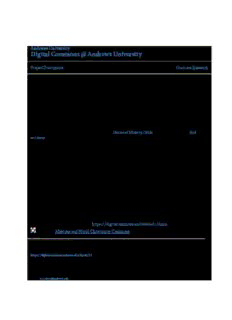
Understanding and Dealing With Ancestral Practices in Botswana PDF
Preview Understanding and Dealing With Ancestral Practices in Botswana
AAnnddrreewwss UUnniivveerrssiittyy DDiiggiittaall CCoommmmoonnss @@ AAnnddrreewwss UUnniivveerrssiittyy Dissertation Projects DMin Graduate Research 1997 UUnnddeerrssttaannddiinngg aanndd DDeeaalliinngg WWiitthh AAnncceessttrraall PPrraaccttiicceess iinn BBoottsswwaannaa Stanley P. Chikwekwe Andrews University Follow this and additional works at: https://digitalcommons.andrews.edu/dmin Part of the Missions and World Christianity Commons RReeccoommmmeennddeedd CCiittaattiioonn Chikwekwe, Stanley P., "Understanding and Dealing With Ancestral Practices in Botswana" (1997). Dissertation Projects DMin. 32. https://digitalcommons.andrews.edu/dmin/32 This Project Report is brought to you for free and open access by the Graduate Research at Digital Commons @ Andrews University. It has been accepted for inclusion in Dissertation Projects DMin by an authorized administrator of Digital Commons @ Andrews University. For more information, please contact [email protected]. Thank you for your interest in the Andrews University Digital Library of Dissertations and Theses . Please honor the copyright of this document by not duplicating or distributing additional copies in any form without the author’s express written permission. Thanks for your cooperation. INFORMATION TO USERS This manuscript has been reproduced from the microfilm master. UMi films the text directly from the original or copy submitted. Thus, some thesis and dissertation copies are in typewriter face, while others may be from any type of computer printer. The quality of this reproduction is dependent upon the quality of the copy submitted. Broken or indistinct print, colored or poor quality illustrations and photographs, print bleedthrough, substandard margins, and improper alignment can adversely affect reproduction. In the unlikely event that the author did not send UMI a complete manuscript and there are missing pages, these will be noted. Also, if unauthorized copyright material had to be removed, a note will indicate the deletion. Oversize materials (e.g., maps, drawings, charts) are reproduced by sectioning the original, beginning at the upper left-hand comer and continuing from left to right in equal sections with small overlaps. ProQuest Information and Learning 300 North Zeeb Road, Ann Arbor, Ml 48106-1346 USA 800-521-0600 UMI Reproduced with permission of the copyright owner. Further reproduction prohibited without permission. Reproduced with permission of the copyright owner. Further reproduction prohibited without permission. ABSTRACT UNDERSTANDING AND DEALING WITH ANCESTRAL PRACTICES IN BOTSWANA by Stanley P. M. Chikwekwe Adviser: Bruce L. Bauer Reproduced with permission of the copyright owner. Further reproduction prohibited without permission. ABSTRACT OF GRADUATE RESEARCH D.Min. Dissertation Andrews University Seventh-day Adventist Theological Seminary Title: UNDERSTANDING AND DEALING WITH ANCESTR.AL PRACTICES IN BOTSWANA Name of researcher: Stanley P. M. Chikwekwe Name and degree of faculty adviser: Bruce L. Bauer. D.Miss. Date completed: June 1997 Problem Ancestral and other traditional practices continue to trouble the Seventh-day Adventist Church in several parts of the world. It is not uncommon for believers to seek ancestors' mediation whenever they are faced with problems. Most church members deny that ancestral and other traditional practices exist within the church, whereas others do not want to discuss the issue of traditional practices because of fear of being labeled superstitious. The denial is due to the way the church has handled ancestral practices in the past. Because most members do not know what to do when problems come, they revert to ancestral practices. Reproduced with permission of the copyright owner. Further reproduction prohibited without permission. Method This study discussed ancestral practices and how they relate to culture. It also addressed contextualization and explored ways of replacing traditional practices with biblically accepted functional substitutes. The materials used were gathered through personal interviews and from several libraries in North America and in Botswana. Conclusions Contrary to past hopes, problems related to ancestral and other traditional practices will not disappear by themselves because these practices satisfy psychological as well as spiritual needs among those who practice them. The church should openly discuss these issues and become aggressive in finding Christian replacements for these practices. Members should become involved in this process. If proper principles of contextualization are followed, it is possible to find meaningful replacements which are biblically acceptable. The process of arriving at appropriate Christian functional substitutes should center around Scripture and dependence upon the Holy Spirit for guidance. It is after appropriate functional substitutes have been found that the church can effectively help people who are affected by ancestral and other traditional practices. Reproduced with permission of the copyright owner. Further reproduction prohibited without permission. Reproduced with permission of the copyright owner. Further reproduction prohibited without permission. Andrews University Seventh-day Adventist Theological Seminary LWDERSTANDING AND DEALING WITH ANCESTRAL PRACTICES IN BOTSWANA A Dissertation Presented in Partial Fulfillment of the Requirements for the Degree Doctor of Ministry by Stanley P. M. Chikwekwe June 1997 Reproduced with permission of the copyright owner. Further reproduction prohibited without permission. UMI Number: 3096437 UMI UMI Microform 3096437 Copyright 2003 by ProQuest Information and Learning Company. All rights reserved. This microform edition is protected against unauthorized copying under Title 17, United States Code. ProQuest Information and teaming Company 300 North Zeeb Road P.O. Box 1346 Ann Arbor, Ml 48106-1346 Reproduced with permission of the copyright owner. Further reproduction prohibited without permission.
